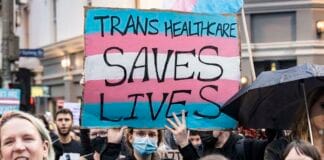The Liberals’ plans for a plebiscite on equal marriage are now in serious doubt, with both The Greens and Nick Xenophon’s party deciding to vote against it.
Unless the Labor Party supports the plebiscite, enabling legislation will not get through the Senate.
Labor is attempting to move a private members’ bill to bring on a direct parliamentary vote on equal marriage, and has yet to decide whether it will oppose a plebiscite if the move for the parliamentary vote fails.
Labor and The Greens are right that the issue should be determined by a direct vote in parliament. There is overwhelmingly public support for equal marriage. The August Essential poll recorded 57 per cent in support.
Turnbull needs to be pressured for this—as campaigners did in Sydney with a sizeable demonstration in August.
A stand-off over the plebiscite could help force Turnbull to allow a vote on a private members’ bill. Numbers in the lower house are close; it would only take a handful of Coalition MPs to cross the floor for the vote to succeed.
If a parliamentary vote fails, the pressure to deal with the issue through a plebiscite could grow. The plebiscite was adopted as a tactic to delay equal marriage and keep the homophobic right-wing of the Coalition happy.
Those who hope to get married may not want to wait two years or more, until after the next election, to do so.
A plebiscite would not be the calamity of rampant homophobia that some in the LGBTI community are suggesting. Rodney Croome, who recently set up a new campaign group to oppose a plebiscite, said that the inevitable result of a plebiscite is that someone, “dies at his own hand because of the hate and fear-mongering”.
But the homophobes who oppose equal marriage constantly spew hatred. Following the AFL’s first gay pride game this year, homophobic leaflets attacking equal marriage were distributed outside games.
An active plebiscite campaign would demonstrate the overwhelming support that exists for equal marriage.
Some campaigners involved in the successful Irish referendum on same-sex marriage have pointed to homophobia during their campaign as a reason to stop the plebiscite.
But as Gráinne Healy, co-director of the campaign said, the result gave LGBTI people the chance “to come out more comfortably and completely, some for the very first time”. A year on, a survey of 1300 young people aged 14 to 24 showed it has made it easier for young LGBTI people to come out, with 49 per cent saying it had given them extra confidence.
The wide public support that now exists in Australia for same–sex marriage came about because the LGTBI community stood up to homophobia.
The immediate task is to build pressure on Turnbull to allow a direct parliamentary vote. But if there is a plebiscite, we should be confident that a “yes” can strike a blow against the homophobes of the Coalition and the churches and against homophobia in society more generally.




